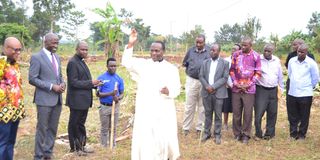Prime
How farmer field schools have boosted agriculture

Kasana-Luweero Diocesan Administrator Fr Francis Xavier Mpanga (centre) blesses the land at Mulungiomu Village in Nakaseke District for proposed Farm Field School. PHOTO/Dan Wandera
What you need to know:
The initiative provides farmers with an opportunity to experiment new technologies which help them to make informed decisions that eventually lead to increased production and income.
Ms Aidah Nabweteme, a farmer at Kireku Village in Kamira Sub-county, Luweero District is able to process the orange-fleshed sweet potato from her garden into various products, including cakes.
This is possible due to the successful rollout of the farmer field schools, an initiative by the Catholic Church, government and Food Agriculture Organisation (FAO).
The field school is a participatory education approach that brings together small-scale food producers to solve production problems and increase income.
The initiative has also boosted production and farm product value chain among farmers in Greater Luweero.
Ms Nabweteme attributes her expertise to various trainings and knowledge acquired from the farm field school under the Caritas Kasana-Luweero Diocese which she joined in 2020.
“While we still have a challenge of getting our products certified by the Uganda National Bureau of Standards (UNBS) to get to the national market, we are able to sell the products locally. I have an additional home income source for my family,” she says.
The project has improved farming systems and promotion of the value chain mechanism for farmers in the districts of Luweero, Nakaseke and Nakasongola.
Dr Fred Kabango, the assistant commissioner-in-charge of soil and water conservation at the Ministry of Agriculture, Animal Industry, and Fisheries, says adding value to farm produce is a priority for all government farmer interventions undertaken by the ministry.
“The success story about the farmers who have attended the field schools and are able to process farm products into finished goods before getting to the market is very encouraging. We also advise that farmers make use of the extension staff to gain more skills and use all the available opportunities for better livelihoods,” he told the farmers at their maiden graduation at Mulungi-Omu Village in Nakaseke Sub-county on Tuesday.
Government has made available the micro-irrigation scheme that can be accessed by the farmers through their respective local governments under the Agriculture ministry.
Rev Fr Hillary Muhezangango, the director of Caritas Kasana-Luweero Diocese, says the farmer field school approach is aimed at helping farmers adapt to the community–based ecosystem, functional watershed management, improve farming methods, and cultivation of high yield crops and fodder grasses.
Kasana-Luweero Diocese has planned to construct permanent farm school structures at Mulungi Omu Village in Nakaseke District for agricultural training and research.
The diocese owns more than 200 acres of land at Mulungi Omu Village, where the farmers are able to conduct demonstrations for the different farming projects.
The beneficiaries are the sub-counties of Kikyusa, Bamunanika, Kamira and Butuntumula in Luweero District and Wakyato, Ngoma, and Kinoni sub-counties in Nakaseke District.
About the project
Under the farmer field schools, farmers are able to access knowledge at their respective farms through the different training modules supervised by extension scouts.
While agriculture is the backbone of Uganda’s economy and employs more than 65 percent of Ugandans and feeds more than 80 percent of the country’s industries with raw materials, most farmers practise it without training, something that has limited their opportunities of transitioning from subsistence farming to commercial agriculture.





